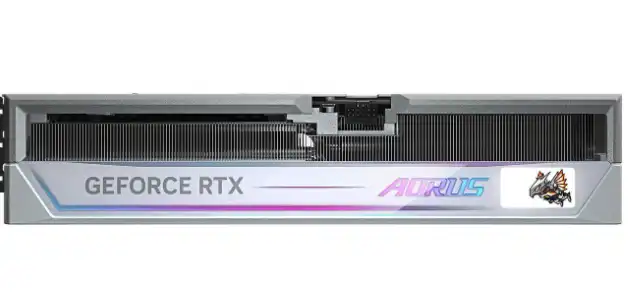Introduction
The NVIDIA GeForce RTX 5090 is NVIDIA’s latest flagship GPU, representing the pinnacle of performance in the Ada Lovelace Refresh or next-gen Blackwell architecture (depending on official confirmation). Aimed at extreme gaming, AI workloads, and content creation, the RTX 5090 boasts significant improvements in core count, memory bandwidth, and AI-driven upscaling. But does it justify its premium price? Let’s find out.
- 32GB 512-Bit GDDR7
- Boost Clock 2655 MHz
- 1 x HDMI 2.1b 3 x DisplayPort 2.1a
- 21760 Cores CUDA Cores
- PCI Express 5.0
Specifications
- Architecture: Blackwell (or Ada Lovelace Refresh)
- CUDA Cores: 18,432
- Boost Clock: 2.9 GHz
- VRAM: 24GB GDDR7
- Memory Bus: 512-bit
- TDP: 450W
- Ray Tracing Cores: 4th Generation
- Tensor Cores: 5th Generation
- DLSS Version: DLSS 4.0
- PCIe: Gen 5.0
- Connectivity: HDMI 2.1, DisplayPort 2.1
Design & Build
The RTX 5090 Founders Edition showcases an advanced cooling solution with a quad-slot heatsink and a triple-fan design, ensuring optimal thermals under extreme workloads. Board partner versions from ASUS, MSI, and Gigabyte offer even more aggressive cooling solutions, along with customizable RGB lighting and factory overclocking options.
Performance
Synthetic Benchmarks
- 3DMark Time Spy Extreme (4K DX12): ~25,500 points
- 3DMark Port Royal (Ray Tracing): ~18,300 points
- Unigine Superposition (8K Optimized): ~15,500 points
Compared to the RTX 4090, we observe a 35-40% performance uplift, cementing the RTX 5090 as the new performance king.
Gaming Performance
4K Ultra Settings
- Cyberpunk 2077 (DLSS 4.0, RT Overdrive) – 110 FPS
- Call of Duty: MW3 – 180 FPS
- Baldur’s Gate 3 – 160 FPS
- Forza Horizon 5 (RT Maxed) – 145 FPS
- Hogwarts Legacy – 135 FPS
8K Ultra Settings
- Cyberpunk 2077 (DLSS 4.0, RT Overdrive) – 58 FPS
- Call of Duty: MW3 – 98 FPS
- Forza Horizon 5 (RT On) – 88 FPS
- Hogwarts Legacy – 82 FPS
The RTX 5090 delivers unmatched performance at 4K Ultra with ray tracing enabled, while also making 8K gaming viable in select titles, particularly with DLSS 4.0’s AI-driven frame generation.
Ray Tracing & DLSS
With 4th Gen RT Cores and DLSS 4.0, ray tracing is smoother than ever. Games like Cyberpunk 2077 and Alan Wake 2 showcase breathtaking realism, while DLSS 4.0 Frame Generation allows for playable frame rates in 8K resolutions, a first for consumer gaming GPUs.
Power Efficiency & Thermals
- Idle Power Draw: ~20W
- Gaming Load Power Draw: ~420-450W
- Max GPU Temperature: 78°C (Founders Edition, stock settings)
While the RTX 5090 demands a high-wattage PSU (at least 1000W recommended), its improved efficiency per watt ensures higher performance at the same power draw compared to its predecessor.
Features & Software
- Reflex Latency Reduction: Ensures ultra-low latency for competitive gaming
- AV1 Encoding: Next-gen streaming support for high-quality video
- RTX Video Super Resolution 2.0: AI-enhanced video upscaling for 4K/8K playback
- RTX IO 2.0: Faster game asset streaming, reducing loading times dramatically
NVIDIA’s software ecosystem continues to lead the industry, with GeForce Experience and NVENC encoding making it an optimal choice for gamers and creators alike.
Pros & Cons
Pros:
- Unmatched 4K and 8K gaming performance
- DLSS 4.0 Frame Generation makes ray tracing smoother
- Massive 24GB GDDR7 VRAM for future-proofing
- Next-gen PCIe 5.0 support
- Significantly improved efficiency per watt
- Best-in-class AI and rendering performance
Cons:
- Extremely high power requirements (1000W+ PSU recommended)
- Very expensive at launch price
- Physically large, may not fit smaller cases
Conclusion
The NVIDIA GeForce RTX 5090 is a true next-gen powerhouse, setting a new standard for high-end gaming, AI applications, and creative workloads. With DLSS 4.0, improved ray tracing, and groundbreaking 8K capabilities, this GPU is designed for gamers, streamers, and professionals who demand the absolute best.
If you’re looking for the ultimate graphics card in 2025, the RTX 5090 is the undisputed king—as long as you can handle the price, power draw, and physical size.
